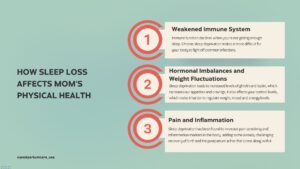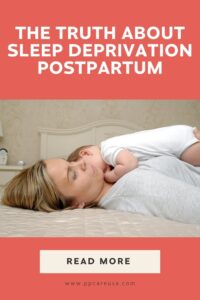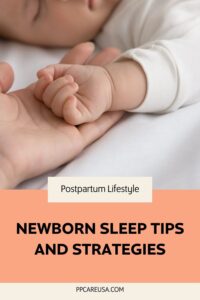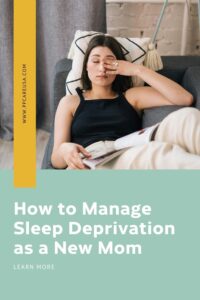How does sleep deprivation affect our physical and mental health?
Becoming a mom is one of life’s most beautiful transitions, but if I’m being totally honest, it’s also one of the most exhausting. The first year of your baby’s life is filled with unforgettable moments, and the amazing moments also come with a lot less sleep—especially for moms.
Sleep deprivation is probably one of the biggest worries new and expecting moms have when it comes to having a baby. We all hear about how sleep is affected when you have a baby, but it’s hard to describe exactly what the sleepless nights and sleep deprivation truly feel like.
While the sleepless nights might feel like just another part of the “new mom” package, they have a real impact on not just your mental health, but also your physical health. I’m going to break down how much sleep moms actually lose, how it affects your body and brain, and what you can do to protect your wellbeing.
How much sleep do moms actually lose in that first year?
One study found that new parents lose around 700 hours of sleep in their baby’s first year. That’s nearly three months of sleep! No one could ever prepare you for what that feels like.
Another surprising fact that was found by a different study was that new parents’ sleep does not fully recover until their child is six years old, and, not surprising here, the most dramatic decline happens during the first year.
One myth I want to debunk is that formula fed babies sleep longer than breastfed babies. The data on this one is just not consistent enough to conclude that. One study found that breastfeeding moms and babies might actually sleep a little longer. The gist here is that whether your baby is breast, bottle or formula fed, they will wake up overnight.
This loss of sleep in that first year isn’t just because of baby waking overnight; it could also be related to any hormonal changes leading to insomnia, maybe stress and anxiety. There are a lot of changes that happen in that first year postpartum that add to sleep challenges for mama.
What does sleep deprivation do to a new mom’s mental health?
1. Increased Risk for Postpartum Mood Disorders
Sleep is the foundation of mental wellness. For new moms, the combination of hormonal shifts, emotional upheaval, and round-the-clock caregiving creates a vulnerable environment—and lack of sleep can worsen everything.
One study found that poor sleep quality significantly predicted postpartum depression, while another study found that low sleep was linked with heightened emotional reactivity, irritability, sadness and anxiety.
2. Cognitive Impairment and Brain Fog
The part of the brain that helps with planning, decision making, and memory is drastically affected by sleep deprivation. One study confirmed that even moderate sleep deprivation can have negative effects on cognitive performance.
What does this do to Mom? You know “mom brain”? All that sleep loss can lead to forgetfulness, zoning out during conversations, and fogginess.
3. Inability to regulate their emotions
Have you heard the phrase, “crying over spilled milk”? I agree spilling any amount of your milk that you worked so hard for is worth being upset about, but sometimes this lack of sleep can make it feel like a major crisis.
Sleep loss makes it difficult to regulate your emotions, which could already feel a bit haywire due to postpartum hormones. This can cause strains on your relationship, increase your feelings of guilt or inadequacy, and reduce your patience.
How Sleep Loss Affects Mom’s Physical Health
So much takes place in your body when you sleep. Your body and brain repair and reset. Without sleep, your physical health becomes affected as well.
Weakened Immune System
Immune function declines when you’re not getting enough sleep. Chronic sleep deprivation makes it more difficult for your body to fight off common infections—which is the last thing a new mom needs.
Hormonal Imbalances and Weight Fluctuations
Did you know that sleep regulates your hunger hormones ghrelin and leptin? It’s no surprise that sleep deprivation affects these things as well.
Sleep deprivation leads to increased levels of ghrelin and leptin, which increases our appetites and cravings. It also affects your cortisol levels, which make it harder to regulate weight, mood and energy levels.
Pain and Inflammation
Sleep deprivation has been found to increase pain sensitivity and inflammation markers in the body, adding to the already challenging recovery of birth and the postpartum aches that come along with it.

We are too often hearing “newborn trenches” instead of the once popular “newborn bliss”—why is that?
Women are now being asked to take on more responsibility than ever with the least amount of support. We are asked to parent like we have no job and work like we have no kids. There’s little-to-no paid maternity leave. Just when your newborn is sleeping a tad longer stretches, you’re back to work and all that comes with that. Many moms feel like they’re just surviving, and the lack of built in support makes it even harder to ask for help.
Sleep deprivation and its effects are not a badge of honor. They are not something you need to suffer through because you chose to grow your family. It is okay to say, “I’m not okay”. And it is okay to want to do something about that lack of sleep!
How to Manage Sleep Deprivation in the First Year
In those early months with your newborn, your baby is likely to wake up often overnight. There isn’t much we can do about it except ensure we are optimizing sleep safely and age appropriately.
My first piece of advice would be to ensure feeding is going well. A newborn that feeds well is going to sleep well. In those first couple of weeks, your baby will likely need to wake to feed every 3 hours overnight, but always check in with your pediatrician.
Once given the green light from them, you might even be able to support your newborn to get even longer stretches. Trust me, 3-4 hour stretches of sleep feel a million times better than waking every 60-90 minutes all night. And this is possible, even with a newborn!
Ensuring feeding is going well is going to be the very first step. Things like supply and latch issues can make it much harder for a newborn to sleep well. Meeting and getting a full assessment by a board certified lactation consultant will make sure you are not struggling with things like oral restrictions.
My second piece of advice would be to learn as much as you can about newborn sleep. Knowing how newborns sleep and techniques to support them will make a huge difference to maximizing yours and your baby’s sleep.
It’s okay to want to improve your sleep—it’s not selfish. In fact, it will make you an even better mom for your sweet baby.
Strategies to Increase Your Sleep in That First Year:
- Ask for help! We used to live together in villages with all the extra help. Remember, it takes a village!
- Sleep when the baby sleeps. As cliche as it sounds, adding even 30 minutes here and there begins to add up and make a big difference.
- Avoid blue light. Set yourself up for success by avoiding blue light (that means no late night doom scrolling). Use white noise and blackout curtains to try and go to sleep a little earlier or sleep in a little later.
- Delegate things you can delegate. Have a support person wash bottles or change diapers, especially in the middle of the night so you all can get back to sleep faster.
Look into the support you are offered. Maybe it’s a postpartum doula. Maybe it’s a mental health therapist. You are not alone, and support is available!
Pin This for Later:




I am Tiffany Lebano, Pediatric RN, IBCLC, newborn care specialist and baby sleep expert. Oh and Mom of 4 sweet babies! I am devoted to helping moms thrive in postpartum. Motherhood is full of love and pressure, expectations and noise. In a world that says we need to “do it all”, I am here to remind you that you are allowed to rest and ask for help. Your needs matter too. You can’t care for your baby if you are not taking care of yourself.
If you are struggling with sleep, feeding or want to prepare for the arrival of your baby, I’d love to support you.
Book a free 15 minute call with me today and let’s find ways to make life with baby feel like the dream you always dreamed of.
Postnatal Depletion
Meet the Team
Our Services
Supplements
A virtual healthcare clinic that helps postpartum mamas recover from postnatal depletion syndrome with a holistic approach.

Get in touch